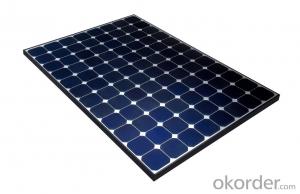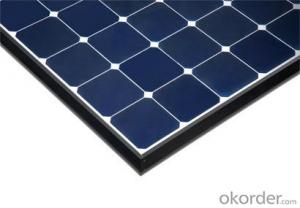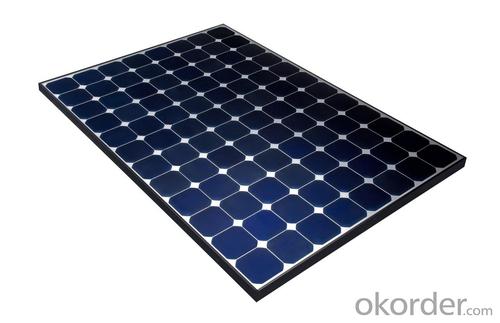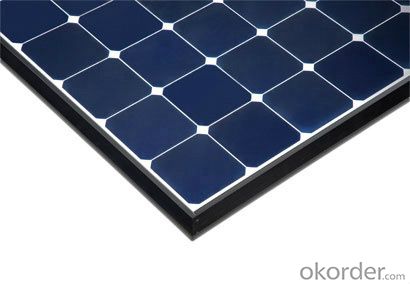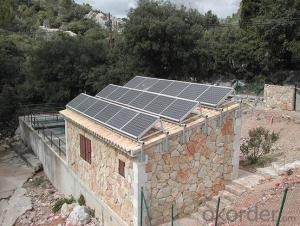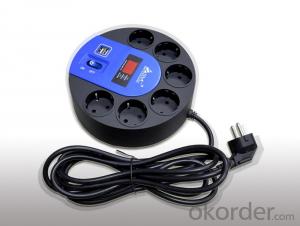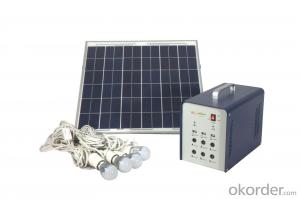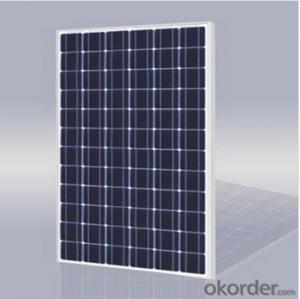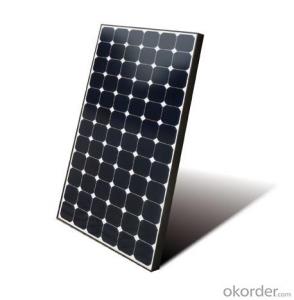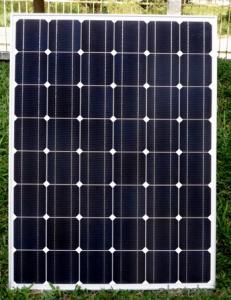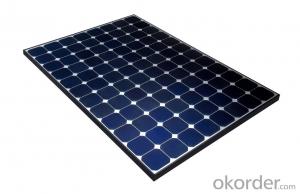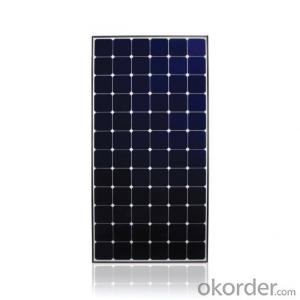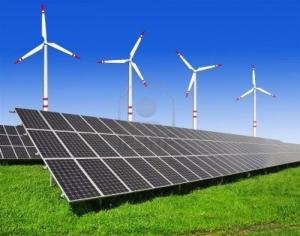500kw CNBM Industrial Solar Energy Systems Monocrystalline Silicon Panel for Home Use
- Loading Port:
- Shekou
- Payment Terms:
- TT OR LC
- Min Order Qty:
- 100 watt
- Supply Capability:
- 1000 watt/month
OKorder Service Pledge
OKorder Financial Service
You Might Also Like
Specification
500KW CNBM Monocrystalline Silicon Panel for Home Using
Production description
Solar power is the conversion of sunlight into electricity, either directly using photovoltaics (PV), or indirectly using concentrated solar power (CSP). Concentrated solar power systems use lenses or mirrors and tracking systems to focus a large area of sunlight into a small beam. Photovoltaics convert light into anelectric current using the photovoltaic effect.[1]
The International Energy Agency projected in 2014 that under its "high renewables" scenario, by 2050, solar photovoltaics and concentrated solar power would contribute about 16 and 11 percent, respectively, of theworldwide electricity consumption, and solar would be the world's largest source of electricity. Most solar installations would be in China and India.[2]
Solar energy is radiant light and heat from the Sun harnessed using a range of ever-evolving technologies such assolar heating, photovoltaics, solar thermal energy, solar architecture and artificial photosynthesis.
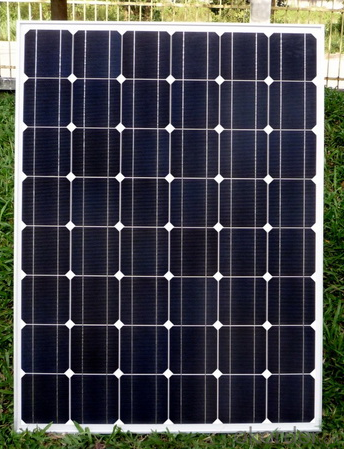
Feature
1.High conversion efficiencies resulting in superior power output performance.
2.Outstanding power output even in low light or high temperature conditions
3.Optimized design for ease of soldering and lamination
Physical characteristic
1. Rigorous quality control meets the highest international standards.
2. High-transmissivity low-iron tempered glass, strong aluminium frame.
3. Using UV-resistant silicon.
4. IS09001/14001/CE/TUV/UL
packaging
26pcs in one carton 6pallets in 20foot container 14pallets in 40 foot container.
- Q: How does the installation of solar panels affect the building's resale value?
- A building's resale value can be positively affected by the installation of solar panels. Solar panels are regarded as a valuable addition to a property due to the multiple benefits they offer. To begin with, potential buyers find solar panels highly appealing as they can significantly reduce or even eliminate electricity bills. This feature is attractive and can make a property more enticing, ultimately increasing its market value. Furthermore, the current concerns surrounding climate change and the growing interest in sustainable living make solar panels a desirable feature that aligns with eco-conscious values. Additionally, solar panels have the potential to generate income through net metering programs. In certain regions, surplus electricity generated by solar panels can be sold back to the grid, creating an additional source of revenue. This financial advantage enhances the value of a property and attracts buyers who are interested in investing in renewable energy. Moreover, the installation of solar panels contributes to the overall energy efficiency of a building. This leads to improved energy performance ratings and certifications, such as LEED or Energy Star, further boosting the resale value of the property. Nevertheless, it is crucial to note that the impact on resale value can vary depending on factors such as the property's location, local housing market trends, and the size and quality of the solar panel system. It is advisable to seek guidance from real estate professionals or appraisers experienced in evaluating the impact of solar panels on property values in a specific area.
- Q: How do solar energy systems impact the stability of the electrical grid?
- Solar energy systems can have both positive and negative impacts on the stability of the electrical grid. On one hand, solar energy systems help diversify the energy mix by providing a clean and renewable source of electricity. This reduces the reliance on fossil fuels and decreases greenhouse gas emissions, leading to a more sustainable and environmentally friendly grid. Additionally, solar energy systems can contribute to grid stability by reducing the peak demand for electricity during daylight hours. During sunny periods, solar panels produce electricity at their maximum capacity, which can offset the need for fossil fuel-based power plants to operate at their peak levels. This can help alleviate strain on the grid during times of high demand and prevent potential power outages or blackouts. However, solar energy systems also pose challenges to the stability of the electrical grid. One of the main challenges is intermittency. Solar power generation is dependent on weather conditions, so it fluctuates throughout the day. This intermittency can create imbalances between electricity supply and demand, which can destabilize the grid. To mitigate this issue, grid operators must carefully manage the integration of solar energy systems into the grid by employing advanced forecasting and grid management technologies. Furthermore, the high penetration of solar energy systems in certain regions can lead to over-generation during peak solar production hours. This excess electricity may not be efficiently utilized or stored, potentially causing voltage fluctuations and grid instability. Grid operators need to invest in energy storage technologies such as batteries to store surplus solar power and release it when needed, ensuring grid stability. In conclusion, solar energy systems have a significant impact on the stability of the electrical grid. While they contribute to a cleaner and more sustainable energy mix, their intermittent nature and potential for over-generation require careful grid management and the integration of energy storage technologies. With proper planning and investment, solar energy systems can play a crucial role in achieving a stable and resilient electrical grid.
- Q: What is the role of maximum power point tracking (MPPT) in a solar energy system?
- The role of maximum power point tracking (MPPT) in a solar energy system is to maximize the efficiency and output of the system by continuously adjusting the operating point of the solar panels to ensure they are operating at their maximum power point. This is important because the power output of solar panels is highly dependent on environmental factors such as temperature and sunlight intensity. MPPT algorithms track these variations and optimize the power output by adjusting the voltage and current to match the maximum power point. By doing so, MPPT increases the overall energy generation and improves the performance of the solar energy system.
- Q: Do solar energy systems require batteries for energy storage?
- No, solar energy systems do not necessarily require batteries for energy storage. They can be connected to the electric grid, allowing excess energy generated during the day to be sent back to the grid and used later when the solar panels are not producing electricity. However, batteries can be added to a solar energy system to store excess energy for later use, providing more independence from the grid and allowing for energy usage during nighttime or cloudy days.
- Q: Can a solar energy system be installed on a building with a thatched roof?
- Yes, a solar energy system can be installed on a building with a thatched roof. However, it may require additional considerations and adaptations to ensure the stability and durability of the system. Thatched roofs are typically made of natural materials like straw or reeds, which may not be as structurally strong or resistant to moisture as conventional roofing materials. Therefore, careful planning and consultation with solar energy experts are necessary to ensure proper installation techniques and the protection of the thatched roof.
- Q: Can solar energy systems be used for powering amusement parks?
- Yes, solar energy systems can definitely be used to power amusement parks. By installing solar panels, amusement parks can generate clean and renewable energy to meet their power needs. Solar energy systems can provide electricity for rides, lighting, and other facilities within the park, reducing the reliance on fossil fuels and lowering operational costs. Additionally, solar power can contribute to a greener image for the amusement park, attracting environmentally conscious visitors.
- Q: Can solar energy systems be used for powering transportation infrastructure?
- Yes, solar energy systems can be used for powering transportation infrastructure. Solar energy can be converted into electricity through the use of photovoltaic panels, which can then be used to power electric vehicles or be stored in batteries for later use. This can be particularly beneficial for public transportation systems, such as buses or trains, as well as personal vehicles. Solar-powered charging stations can be installed along highways or in parking lots, allowing electric vehicles to be charged using clean and renewable energy. Additionally, solar energy can also be used to power traffic lights, streetlights, and other infrastructure components, reducing the reliance on fossil fuels and lowering greenhouse gas emissions. Overall, utilizing solar energy for transportation infrastructure can contribute to a more sustainable and environmentally friendly transportation system.
- Q: Can solar energy systems be used in areas with limited access to financing options?
- Yes, solar energy systems can be used in areas with limited access to financing options. There are various alternative financing options available such as leasing, power purchase agreements, and community funding that make solar energy more accessible to people in areas with limited financing options. Additionally, government incentives and subsidies can also help reduce the financial burden of installing solar energy systems in such areas.
- Q: Are there any ongoing monitoring requirements for solar energy systems?
- Yes, there are ongoing monitoring requirements for solar energy systems. Monitoring is essential to ensure that the solar energy system is operating efficiently and effectively. It helps in identifying any potential issues or malfunctions, allowing for timely repairs or maintenance. Ongoing monitoring typically involves tracking the system's performance, including energy production, system uptime, and any deviations from expected outputs. This can be done through various monitoring tools and technologies, such as real-time monitoring software, data loggers, or remote monitoring systems. Additionally, some jurisdictions or incentive programs may have specific monitoring requirements to ensure compliance with regulations or eligibility criteria. Regular monitoring helps maximize the benefits of solar energy systems and ensures their long-term performance and durability.
- Q: Can a solar energy system be installed on a residential apartment complex?
- A residential apartment complex can have a solar energy system installed. Many apartment complexes already use solar energy systems to generate electricity. These systems can be located on the rooftop or on a nearby structure, depending on space and sunlight. Installing a solar energy system allows apartment complexes to reduce their dependence on traditional grid electricity, decrease their carbon footprint, and potentially save on electricity expenses. Furthermore, residents can enjoy lower energy bills and increased sustainability. However, it is crucial to take into account local regulations, building structure, and ownership arrangements before planning to install a solar energy system on a residential apartment complex.
Send your message to us
500kw CNBM Industrial Solar Energy Systems Monocrystalline Silicon Panel for Home Use
- Loading Port:
- Shekou
- Payment Terms:
- TT OR LC
- Min Order Qty:
- 100 watt
- Supply Capability:
- 1000 watt/month
OKorder Service Pledge
OKorder Financial Service
Similar products
Hot products
Hot Searches
Related keywords
